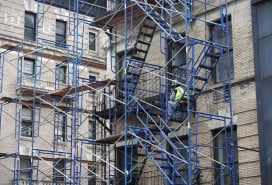Ask Sam: How do I start a tenant association?

NYC tenants in some buildings are joining forces to negotiate with their landlords for breaks on rent, as a result of the Covid-19 pandemic and ensuing job loss.
iStock
What is the purpose of a tenant association, and how do I start one in my building?
Tenant associations are generally as useful as they are easy to create, says Sam Himmelstein, a lawyer with the firm Himmelstein, McConnell, Gribben, Donoghue & Joseph who represents residential and commercial tenants and tenant associations.
"The purpose of a tenant association is to be able to more effectively deal with your landlord on issues you as tenants are facing in common," he says. This includes problems with repairs or services; major capital improvement rent increases; and determining if your building is rent-stabilized or if you're being overcharged.
Recently, tenants in some buildings are joining forces to negotiate with their landlords for breaks on rent, as a result of the Covid-19 pandemic and ensuing job loss. You can read about one tenant who started a tenant association for that purpose.
"Just about any problem you can imagine will be dealt with more effectively as a group, because it somewhat levels the playing field [between the tenants and the landlord] financially, legally, and politically," Himmelstein adds.
Tenants' associations are particularly helpful for problems that are likely to incur legal costs, he says. You can split up the cost of a lawyer among a large number of tenants, meaning that it's cheaper to seek out help, and that your landlord is less likely to try to wear you down by racking up legal fees (as is often the case in disputes with individual tenants).
Occasionally, tenant associations are able to procure major payouts in housing court, as in the recent case of these Harlem tenants who filed a class action lawsuit against their building’s owners for rent overcharges and won a $1.1 million settlement.
Another bonus to organizing with your neighbors: The law protects your right to participate in a tenant organization without retaliation. Under the Housing Stability and Tenant Protection Act, passed in 2019, if a landlord attempts to evict you within a year of you forming a tenant association (along with exercising your other rights as a tenant), it’s presumed retaliatory, and the landlord must provide a credible explanation otherwise. (The HSTPA strengthened an existing law that set the limit at six months for a landlord’s eviction attempts to be considered retaliatory.) Landlords who fail to give a credible explanation after an eviction attempt will have to offer you a new lease or a lease renewal with only a “reasonable” rent increase; plus, they could be responsible for your legal fees.
Also protected under these laws: your rights as a group to use the building's common space for meetings, without retaliation or any sort of additional charges.
In other words, if you band together with your fellow renters, you'll have additional protections. So how to start a tenant association of your own?
"Two people or more can constitute themselves as a tenant association simply by saying, 'We are the 920 West End Avenue Tenant Association,'" says William Gribben, a colleague of Himmelstein's who frequently works with tenant organizations. "A tenant association is an unincorporated, voluntary association."
Once you and your neighbors start calling yourselves a tenant association, you can legally be considered as such.
If your tenant association ever needs to handle money as a group to pay lawyers, engineers, etc., you can either open a bank account in the name of your association (though different banks have different requirements for accounts), Gribben says, or simply divide expenses among yourselves and send in individual checks.
"We always tell people to be as democratic as possible," he adds. "Make decisions on the part of the group with opportunities for everyone to participate."
Of course, you should be prepared for the group to occasionally make decisions you're not 100 percent on board with.
"What you gain in economic and legal power, you lose in individuality," Himmelstein says. "You have to go along with the group or not be in the group—it's very similar to how a labor union works."
One caveat to keep in mind: It may not always be wise for market-rate tenants and rent-stabilized tenants to band together.
"While market-rate tenants have as much of a right as rent-stabilized tenants to form and participate in a tenant association, the problem is that rent-stabilized tenants have that protection of renewal leases, and can't have their rent raised more than a certain amount," Gribben says. "Market-rate tenants are more vulnerable, and even though a landlord can't legally retaliate, it is sometimes hard to prove retaliatory motives."
Instead, some buildings will have two separate tenant associations for market-rate and stabilized residents, or the market-rate residents may let their stabilized, more legally protected neighbors take the lead.
"In a tenant association," Gribben says, "People pretty much have to be in the same boat when it comes to their protections and what it is they're trying to accomplish.
Related:
Ask Sam: What are the rules for evicting rent-stabilized tenants in NYC? (sponsored)
Ask Sam: How do I find out if my apartment is rent-stabilized—and if the landlord owes me money? (sponsored)
Read all the Ask a Renters' Rights Lawyer columns here.
Sam Himmelstein, Esq. represents NYC tenants and tenant associations in disputes over evictions, rent increases, rental conversions, rent stabilization law, lease buyouts, and many other issues. He is a partner at Himmelstein, McConnell, Gribben, Donoghue & Joseph in Manhattan. To submit a question for this column, click here. To ask about a legal consultation, email Sam or call (212) 349-3000.
























